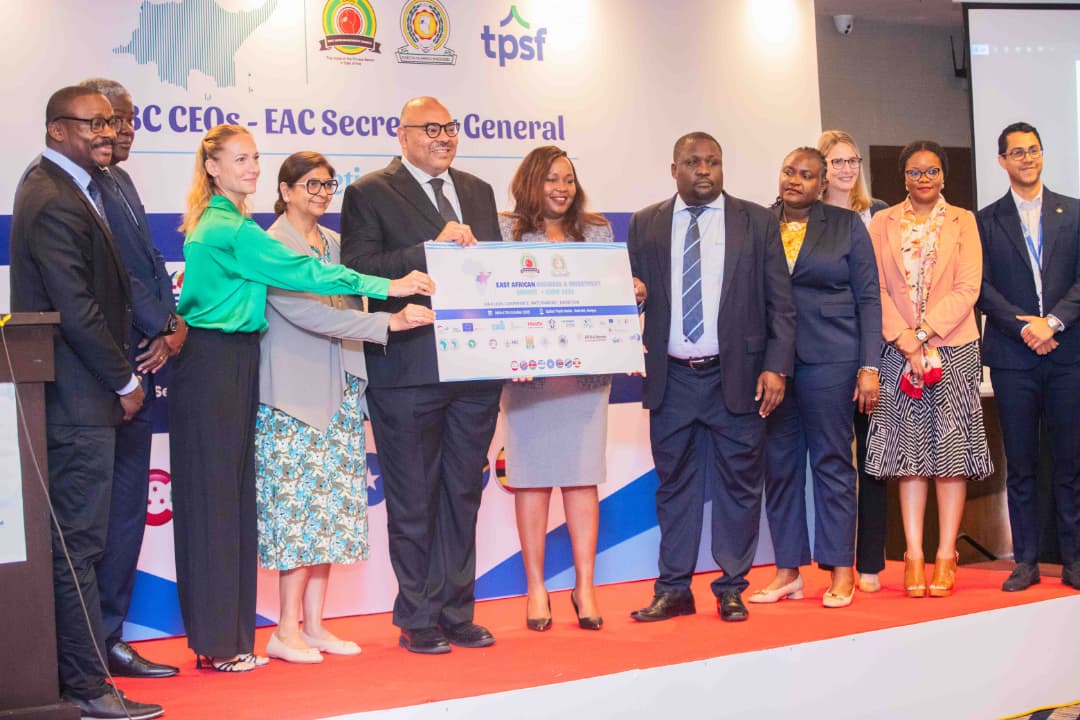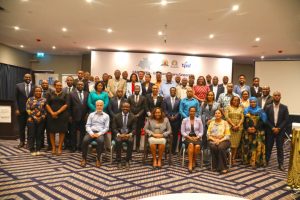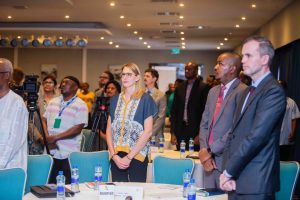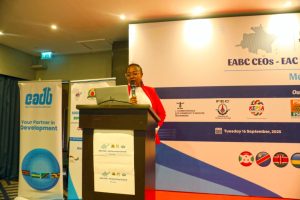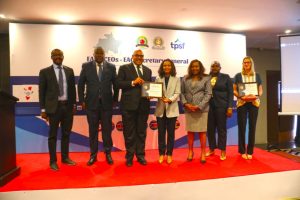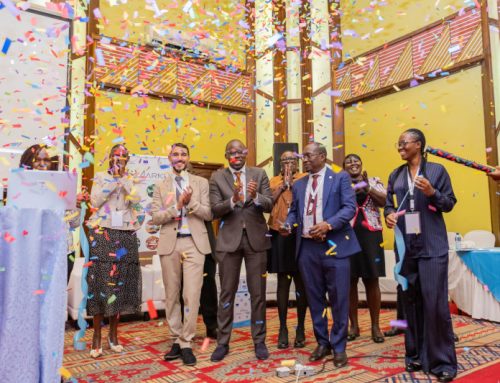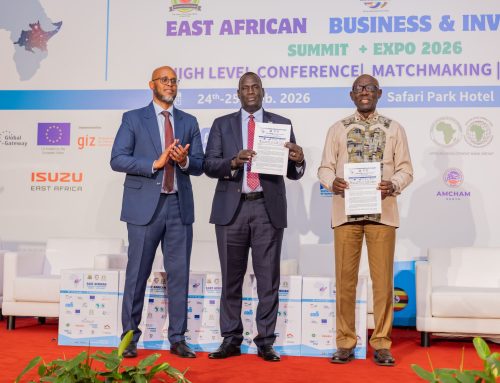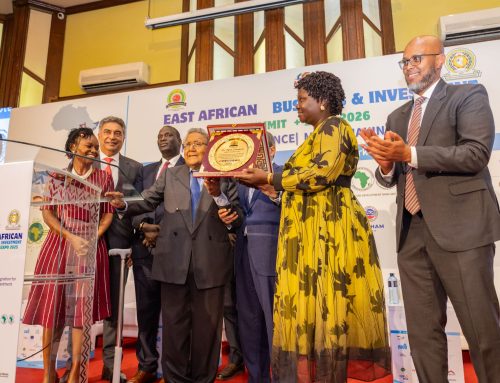- EABC-EAC Secretary General Meeting in Tanzania Chart Path to Boost Intra-Regional Trade and Investment
Dar es Salaam, Tanzania, Wednesday 17th September 2025 – H.E. Amb. Mahmoud Thabit Kombo, Minister of Foreign Affairs and East African Cooperation of the United Republic of Tanzania, urged the East African Community (EAC) to position its competitive edge in value addition of raw resources in light of global developments. He made the call during the EABC CEOs – EAC Secretary General Meeting, Tanzania Edition, organized by the East African Business Council (EABC) in partnership with the East African Community, Tanzania Private Sector Foundation, GIZ, and Tanzania Breweries Ltd.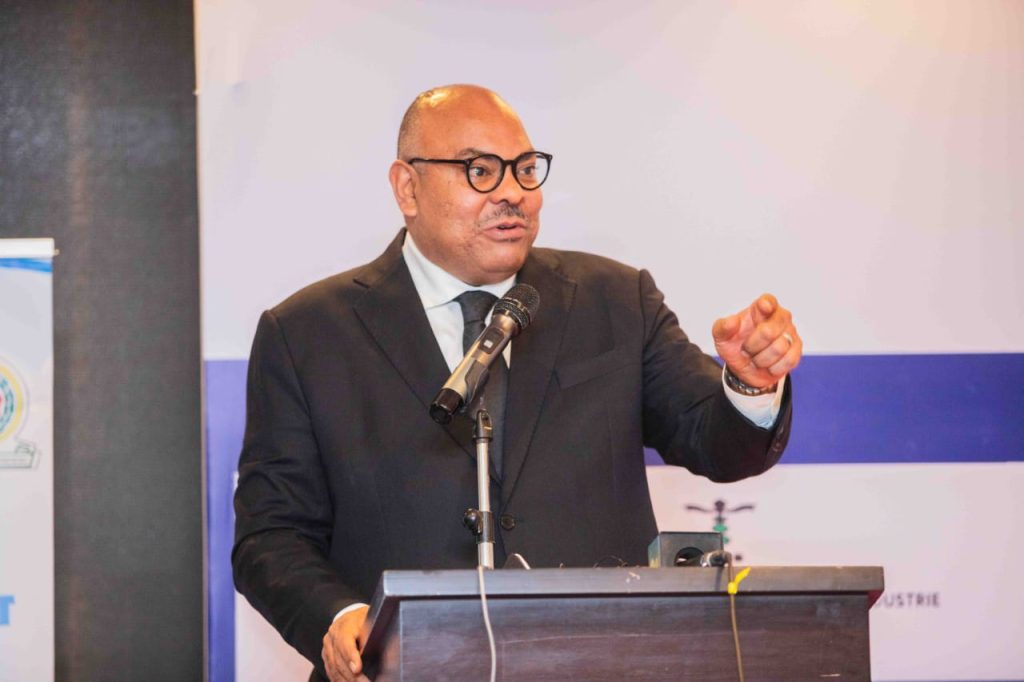
He reiterated Tanzania’s commitment to regional integration and urged the private sector to be proactive in engaging the Ministry to unlock opportunities in intra-EAC trade and investments, emphasizing that the EAC is the only regional economic bloc with a dedicated Permanent Secretary responsible for East African Cooperation.
He stated Tanzania has demonstrated resilience and inclusive growth, with the economy projected to expand by 5.9% in 2025 according to the African Development Bank. This growth reflects the impact of reforms to improve the business environment, industrialization, and deeper regional integration led by Her Excellency Dr. Samia Suluhu Hassan, President of the United Republic of Tanzania.
 In her remarks, H.E. Veronica Nduva, Secretary General of the East African Community (EAC), stated: “The EAC is now Africa’s most integrated regional economic community in trade, retaining 28% of exports within the continent and sourcing 19% of imports from other African countries. Tanzania’s manufacturing, for example, rose from 9% of GDP in 2010 to 23.2% in 2022 under the Integrated Industrial Development Strategy 2025.”
In her remarks, H.E. Veronica Nduva, Secretary General of the East African Community (EAC), stated: “The EAC is now Africa’s most integrated regional economic community in trade, retaining 28% of exports within the continent and sourcing 19% of imports from other African countries. Tanzania’s manufacturing, for example, rose from 9% of GDP in 2010 to 23.2% in 2022 under the Integrated Industrial Development Strategy 2025.”
She called for deliberate actions to boost industrialization—particularly in the cotton-to-textile value chain—noting that manufactured goods account for less than 30% of exports, as the export basket is dominated by raw agricultural commodities, limiting job creation. Currently, 64% of EAC imports remain manufactured goods, mostly from Asia. She reaffirmed the EAC’s commitment to work as one bloc in advancing this agenda.
In his remarks, H.E. Amb. Stephen P. Mbu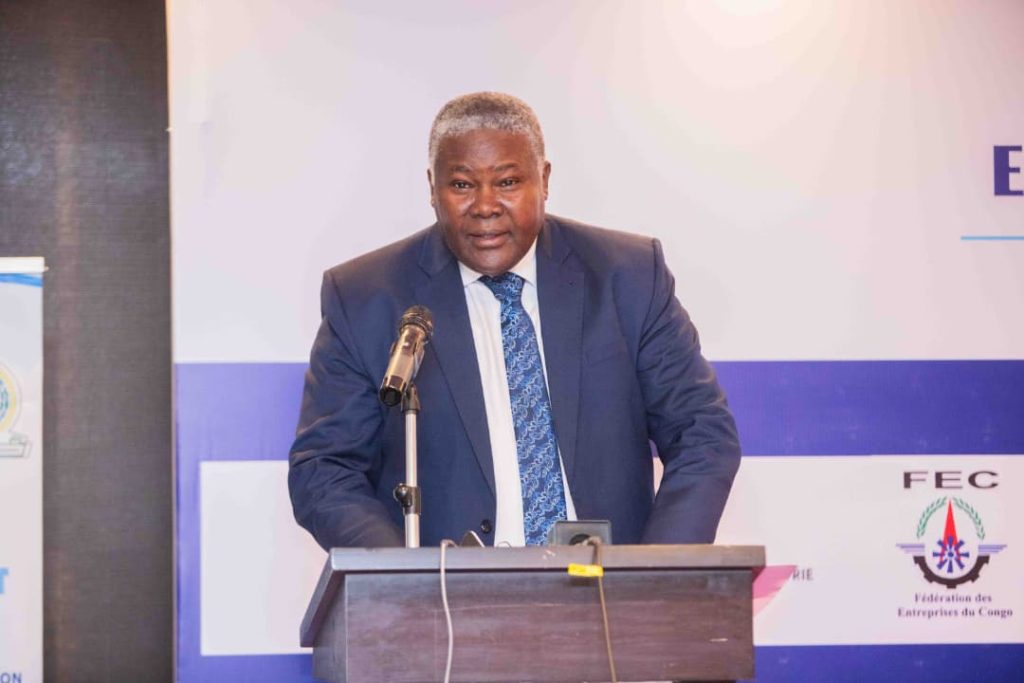 ndi, Permanent Secretary for EAC, Ministry of Foreign Affairs and East African Cooperation of the United Republic of Tanzania, urged the private sector to position the EAC region strategically within the African Continental Free Trade Area (AfCFTA) and the Tripartite Free Trade Area (TFTA).
ndi, Permanent Secretary for EAC, Ministry of Foreign Affairs and East African Cooperation of the United Republic of Tanzania, urged the private sector to position the EAC region strategically within the African Continental Free Trade Area (AfCFTA) and the Tripartite Free Trade Area (TFTA).
 In her speech, Immediate Past Chairperson of EABC, Angelina Ngalula, lauded the EAC Secretary General for taking the time to engage the Tanzanian private sector and proposed that, in order to boost trade and investment ties, it is essential to ensure uniform application of the EAC Common External Tariff), harmonize domestic taxes, eliminate recurring Non-Tariff Barriers, operationalize the EAC Trade Remedies Committee, and fully liberalize trade in services.
In her speech, Immediate Past Chairperson of EABC, Angelina Ngalula, lauded the EAC Secretary General for taking the time to engage the Tanzanian private sector and proposed that, in order to boost trade and investment ties, it is essential to ensure uniform application of the EAC Common External Tariff), harmonize domestic taxes, eliminate recurring Non-Tariff Barriers, operationalize the EAC Trade Remedies Committee, and fully liberalize trade in services.
Mr. Hussein Sufiani, Chairperson of the Confederation of Tanzania Industries (CTI), urged manufacturers and businesses to actively engage in dialogue and present their issues, which will be further synthesized by the EAC-EABC Technical Working Group to inform and challenge proposals within the EAC policy decision-making process.
 In his welcome remarks, Mr. Adrian Raphael Njau, Ag. Executive Director, EABC stated that, in 2023, total EAC trade stood at USD 109 billion, yet intra-EAC trade accounted for only USD 13.8 billion, representing just 13 percent of total trade. Tanzania leads intra-EAC trade with USD 4.9 billion, followed by Kenya at USD 2.85 billion and Uganda at USD 2.14 billion. He elaborated for the region to reach the 40 percent intra-EAC trade target by 2030, we must tackle Non-Tariff Barriers.
In his welcome remarks, Mr. Adrian Raphael Njau, Ag. Executive Director, EABC stated that, in 2023, total EAC trade stood at USD 109 billion, yet intra-EAC trade accounted for only USD 13.8 billion, representing just 13 percent of total trade. Tanzania leads intra-EAC trade with USD 4.9 billion, followed by Kenya at USD 2.85 billion and Uganda at USD 2.14 billion. He elaborated for the region to reach the 40 percent intra-EAC trade target by 2030, we must tackle Non-Tariff Barriers.
Ms. Katharina Stumpf, Deputy Programme Manager, SEAMPEC II–GIZ-EAC, reiterated GIZ’s commitment to supporting governments and strengthening stakeholder voices and proposals to ensure that policies align with market realities, catalyze investments, and expand opportunities for trade.
The meeting also unveiled the East African Business & Investment Summit & Expo 2025 slated to take place on 16th and 17th October 2025 at Safari Parke Hotel in Nairobi, Kenya, organized by East African Business Council (EABC) and the East African Community (EAC), GIZ, East African Development Bank (EADB), TradeMark Africa (TMA), International Trade Centre (ITC), African Civil Aviation Commission (AFCAC) and ISUZU East Africa, and RSM Eastern Africa. Mr. Stephen Wambura, EADB Country Manager, emphasized the EADB’s commitment to regional integration and the private sector development, highlighting that the bank extended financial facility to the Standard Gauge Railway to lower transport costs and strengthen links with landlocked countries and TIB Development Bank offering further financial solutions in key sectors of agriculture and transport among others.
EABC CEOs – EAC Secretary General Meeting convened key senior officials, including H.E. Isaac Njenga, Ambassador of Kenya to Tanzania; and representatives from the Diplomatic Corps of the German Embassy, European Union and the United States of America. The meeting also brought together 80 business leaders from Tanzania who presented bottlenecks and proposed policy solutions across the Manufacturing, Trade in Services, and Agriculture sectors.
In her presentation, Ms. Neema Temba, Director of Legal & Corporate Affairs at Tanzania Breweries Plc – AB InBev Group, urged the EAC to differentiate excise duty proposal based on alcoholic content concentration and address challenges related to i llicit trade.
Mr. Gerald Masila, Executive Director of the East African Grain Council (EAGC), emphasized the critical role of seed certification, food safety, and harmonization of standards in enhancing regional grain trade. He highlighted the opportunities for EAC Partner states to partner with East African grain producers to expand market access under the Tripartite Free Trade Area (TFTA).
The Tanzanian private sector has proposed several policy measures to enhance regional trade efficiency and economic integration, including: extending the validity of Temporary Travel Passes/Permits to ease small-cross border trade; classifying intra-EAC trade as transfers and eliminating discriminatory taxes; ratifying the EAC Double Taxation Agreement to improve investment certainty; abolishing work permit fees for East African nationals to facilitate labor mobility; ratifying the COMESA-EAC-SADC Tripartite Agreement to expand market access; operationalizing the EAC Committee on Trade Remedies to address trade distortions; removing discriminatory excise duties/ levies on EAC originating goods; and strengthening cross-border financial infrastructure through interoperable payment and settlement systems, including national switch integration to lower transaction costs.

